Sunnah Practices for a Healthier Lifestyle
In the fast-paced world we live in today, maintaining a healthy lifestyle can be challenging. However, the Prophet Muhammad (peace be upon him) provided timeless guidance through his Sunnah that can help us lead healthier and more balanced lives. Here are some Sunnah practices that contribute to physical, mental, and spiritual well-being.
Balanced Diet and Moderation
The Prophet Muhammad (peace be upon him) emphasized the importance of moderation in eating. He said, "The son of Adam does not fill any vessel worse than his stomach. It is sufficient for the son of Adam to eat a few mouthfuls to keep him going. If he must fill it, then one third for his food, one third for his drink, and one third for air" (Tirmidhi). Following this principle helps prevent overeating and promotes better digestion.
Regular Physical Activity
Physical activity is another essential component of the Sunnah. The Prophet Muhammad (peace be upon him) engaged in various physical activities, including walking, running, and horseback riding. Walking, in particular, is highly recommended. Studies have shown that regular walking can reduce the risk of chronic diseases and improve mental health.
Dental Hygiene
The Prophet Muhammad (peace be upon him) placed significant emphasis on dental hygiene. He regularly used the miswak (a natural toothbrush) and encouraged its use. He said, "If I had not found it hard for my followers, I would have ordered them to use the miswak for every prayer" (Bukhari). This practice not only promotes oral health but also reflects the importance of cleanliness in Islam.
Introducing our Olive Miswak: a natural, eco-friendly dental care solution inspired by timeless traditions. Crafted from the branches of the olive tree, revered for its purity and numerous health benefits, this miswak is your gateway to holistic oral hygiene.
Sleep and Rest
Adequate sleep and rest are crucial for maintaining good health. The Prophet Muhammad (peace be upon him) recommended taking a short nap (Qailulah) during the day and emphasized the importance of getting sufficient sleep at night. He advised against staying up late unnecessarily and encouraged waking up early for Fajr prayer. This routine aligns with modern research that highlights the benefits of good sleep hygiene.
Mental Health and Reflection
The Sunnah also includes practices that support mental health. Regular prayer, dhikr (remembrance of Allah), and reflection are integral parts of a Muslim's life. The Prophet Muhammad (peace be upon him) often engaged in meditation and reflection, especially during the last third of the night. These practices help reduce stress, promote mindfulness, and strengthen one's connection with Allah.
Fasting
Fasting, particularly during Ramadan, is a vital Sunnah practice with numerous health benefits. The Prophet Muhammad (peace be upon him) also recommended voluntary fasting on Mondays and Thursdays. Fasting has been shown to improve metabolic health, aid in weight management, and enhance mental clarity.
Hygiene and Cleanliness
Personal hygiene and cleanliness are heavily emphasized in the Sunnah. The Prophet Muhammad (peace be upon him) encouraged regular bathing, wearing clean clothes, and maintaining overall cleanliness. These practices are crucial for preventing illness and promoting a sense of well-being.
Incorporating these Sunnah practices into our daily lives can significantly enhance our physical, mental, and spiritual health. ImamAI supports Muslims in adopting these practices by providing reminders, guidance, and educational resources through its platform. By aligning our lifestyles with the teachings of the Prophet Muhammad (peace be upon him), we can achieve a balanced and healthy life that pleases Allah and benefits us in this world and the Hereafter.
For more information and guidance on incorporating Sunnah practices into your daily routine, visit [ImamAI](https://www.imamai.app).



